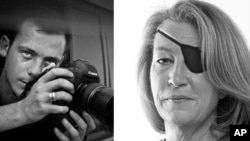Media rights groups say the killing of two Western journalists in the Syrian city of Homs on Wednesday shows Damascus is escalating a violent campaign against independent news coverage of its crackdown on dissent.
Veteran American Sunday Times correspondent Marie Colvin and French freelance photographer Remi Ochlik are the latest journalists to be killed in an 11-month uprising that has become increasingly dangerous for the profession to cover.
Colvin and Ochlik were among group of journalists who sneaked into Syria this month by crossing the Lebanese border with the help of smugglers. The Syrian government does not permit foreign reporters to travel freely and has kept most of them out.
The two journalists were staying at a makeshift media center in the rebel-held Homs district of Baba Amr when several rockets hit the building Wednesday morning, killing them and wounding three other reporters. Activists say Syrian government troops surrounding Homs have been indiscriminately bombarding the residential area every day since February 4.
Reporters Without Borders spokeswoman Soazid Dollet told VOA the Paris-based organization is investigating allegations by some activists that forces loyal to Syrian President Bashar al-Assad deliberately targeted the Baba Amr media center. The group accused Syria of using "the most violent means" to "silence journalists who witness (government) excesses" and to enforce a "bloody" policy of censorship.
The New York-based Committee to Protect Journalists said Colvin and Ochlik were killed reporting on a story the Syrian government has tried to "choke off." It said their deaths represent an "unacceptable escalation in the price that local and international journalists are being forced to pay."
The Syrian Information Ministry said Wednesday the government did not know that Colvin and Ochlik were in the country. It called on all foreign journalists who have entered Syria illegally to report to immigration officials to resolve their status.
Wednesday's attack on the Baba Amr media center wounded three other journalists: French reporter Edith Bouvier, who writes for French newspaper Le Figaro, Colvin's British photographer Paul Conroy, and Paris-based photographer William Daniels.
Amateur video posted on YouTube showed Bouvier and Conroy alert and lying on beds in a makeshift medical clinic, with their legs bandaged from apparent shrapnel wounds. A doctor in the video said Bouvier was in a serious condition and needed emergency medical care.
Dollet of Reporters Without Borders said Colvin's death is a "great loss" for the industry. Colvin, who was in her mid-to-late 50s, was born in New York state. She earned a reputation as a courageous reporter covering some of world's deadliest conflicts for London's Sunday Times, where she had worked for the past two decades.
Colvin was recognizable for wearing an eye patch that concealed an injury she suffered in an explosion while covering Sri Lanka's civil war in 2001.
She acknowledged the risks of her work in a 2010 speech in which she paid tribute to other slain journalists. Speaking at London's St. Bride's Church, she said: "We always have to ask ourselves whether the level of risk is worth the story. What is bravery, and what is bravado? Journalists covering combat shoulder great responsibilities and face difficult choices. Sometimes they pay the ultimate price."
In her final report published on Sunday, she wrote of Homs: "It is a city of the cold and hungry, echoing to exploding shells and bursts of gunfire. On the lips of everyone was the question: 'Why have we been abandoned by the world?'" A day before her death, Colvin spoke to BBC television by telephone and described a two-year-old boy dying of a shrapnel wound: "I watched a little baby die today. Absolutely horrific."
Twenty-eight-year-old Ochlik was born in France. He began his photography career covering riots in Haiti in 2004 and founded photographic agency IP3 Press in 2005. He rose to prominence last year for covering Arab Spring revolutions in Tunisia, Egypt and Libya. His 12-image series titled "Battle for Libya" won him the first prize at this year's World Press Photo contest.
Six other journalists have been killed in Syria since the start of the anti-Assad revolt, one of them a foreigner. French reporter Gilles Jacquier was hit by hostile fire in Homs last month while on assignment for France 2 television.
Media rights groups say the fatalities also include three Syrians who filmed government attacks on Homs and shared the footage with the world: cousins Rami and Basil al-Sayed and Mazhar Tayyara. Dollet called on Syria to stop "deliberately targeting" such "citizen journalists."
A ninth journalist, American New York Times Pulitzer Prize-winning reporter Anthony Shadid, died in Syria from an apparent asthma attack on February 16, after he slipped into the country.
Dollet said Reporters Without Borders believes journalists should stay in Syria to document the conflict, provided they take precautions for their security.
-------------------------
Journalist Fatalities in Syria since Start of Anti-Assad Uprising
* Marie Colvin, American Sunday Times correspondent. Killed on February 22, 2012 in Homs.
* Remi Ochlik, French freelance photographer. Killed on February 22, 2012 in Homs.
* Rami al-Sayed, Syrian citizen journalist. Killed on February 21, 2012 in Homs. Cousin of Basil al-Sayed.
* Anthony Shadid, American New York Times reporter. Died on February 16, 2012 from an asthma attack at an undetermined location in Syria.
* Mazhar Tayyara, Syrian citizen journalist. Killed on February 4, 2012 in Homs.
* Gilles Jacquier, French journalist with France 2 television. Killed on January 11, 2012 in Homs.
* Shukri Abu al-Burghul, editor/reporter for state-owned newspaper Al-Thawra and state-owned Radio Damascus. Killed on January 3, 2012 in Damascus.
* Basil al-Sayed, Syrian citizen journalist. Killed on December 27, 2011 in Homs.
* Ferzat Jarban, freelance cameraman. Killed on November 19 or 20, 2011 in Al-Qasir.




